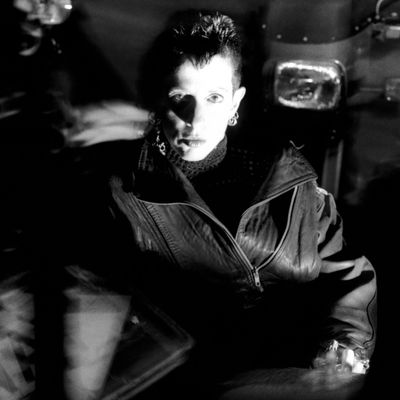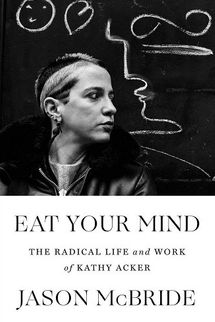
In the 1961 yearbook from the Lenox School, the posh Manhattan girlsÔÇÖ school that Kathy Acker attended, every studentÔÇÖs photo was accompanied by a personal motto. Acker, then in her early teens, chose Virgil: Omnia vincit amor ÔÇö ÔÇ£love conquers all.ÔÇØ Now the phrase seems a fitting epigraph to the writerÔÇÖs too-short life, albeit one that would be complicated and torqued in the decades to come. Just as the characters in her books undergo unexpected transformations, so too did Acker, in her many guises as an uptown prep-school girl, Times Square sex worker, artist, weight-lifting punk-feminist icon, darling of the London literati, and more. Through all this, as Jason McBride writes in Eat Your Mind: The Radical Life and Work of Kathy Acker, it was love ÔÇö torturous and sublime, violent and enlivening ÔÇö that remained at the core of her work and her way of living.
Acker, an experimental novelist, performer, and essayist, resisted the reduction of narrative. In turn, the difficulty of writing a singular story about her has shaped McBrideÔÇÖs book. ItÔÇÖs an exciting ride: critical, admiring, and fascinating if not totally revelatory. In the end, it feels like containing Acker between two neat covers is not just difficult, but impossible. Eat Your Mind often feels chaotically jam-packed with people, texts, and fascinating but compressed social histories of the wild literary and artistic scenes of New York, London, and San Francisco in the 1970s, ÔÇÖ80s, and ÔÇÖ90s. McBride also quotes AckerÔÇÖs own caution against biographical curiosity from what is perhaps her most famous novel, Blood and Guts in High School (1984): ÔÇ£DonÔÇÖt get into the writerÔÇÖs personal life thinking if you like the books youÔÇÖll like the writer. A writerÔÇÖs personal life is horrible and lonely. Writers are queer so keep away from them.ÔÇØ
From this, it may sound like Acker wanted to push people away. But, in fact, she was consumed with trying to draw them in. In the years between when Acker began polarizing readers in the 1970s and when she died from breast cancer in 1997 (at the age of 50, according to McBride, or 53, according to some obituaries), one of her many spiritual advisers declared AckerÔÇÖs enneagram type to be the Tragic Romantic, ÔÇ£who, having attained recognition and material success, remains steadfastly focused on lost love, the unavailable love, a future love, and a picture of happiness only love can bring.ÔÇØ To say that she just wanted to be loved is an eye-rolling clich├® to invoke about someone who resisted that kind of thing. But itÔÇÖs clear that Acker demanded adoration, from friends and family and critics, often to an unreasonable degree. Eat Your Mind is full of anecdotes from friends, romantic partners, and colleagues about what that was really like. (ÔÇ£You were always KathyÔÇÖs friend,ÔÇØ says the author and critic Lynne Tillman. ÔÇ£She was never your friend.ÔÇØ) But Acker did love a lot, and ferociously ÔÇö first and foremost reading and writing, but also friends and partners and animals (real and plush) and New York and San Francisco and sex and motorcycles and teaching and weight lifting and clothes. McBride writes that in her later years, even after sheÔÇÖd received an inheritance from her grandmother that allowed her to write what and when she wanted, ÔÇ£it still wasnÔÇÖt enough ÔǪShe required validation, support, unconditional love.ÔÇØ
She never made it easy. Early in the book, McBride describes reading Acker as hardly like reading at all; you enter it, endure it, allow it to act upon you, like an acid bath  You leave an Acker novel feeling scoured, stunned, ravaged, as if youve just emerged from a car crash or emergency surgery. While this description leaves out the dark humor and shocking exuberance that also characterize her style, it does give a sense of her emotional and intellectual intensity. To McBride, the difficulty of reading Acker is tied up with the difficulty of knowing her as a person. At various points in Eat Your Mind, I found myself wondering what motivates the authors of biographies, and how they relate to the subjects of their inquiry  from a critical distance, or with the desire for intimacy? With suspicion or trust?
There are productive moments when McBride admits to not being sure what to believe. The book fluctuates between factual certainty (confirming or clarifying some events familiar from Ackers self-mythology), open-ended speculation and detective work based on the textual evidence she left, and the vivid memories, both good and bad, of those who knew her. Reading Ackers diaries about the late 60s and early 70s, he observes that, due to her constant blending of reality and fantasy, dream and memory, for the biographer  it means regarding these notebooks, to a certain extent, as enclosed in quotation marks. But there are also times when he seems to crave unmediated closeness with his subject, a questionable goal. Going through her clothes, McBride notes that it was forensically disappointing  Id hoped for some distinct smell.
He acknowledges that he finds it impossible to write a ÔÇ£completeÔÇØ biography, citing Virginia WoolfÔÇÖs Orlando (a book that Acker also made use of in 1982ÔÇÖs Great Expectations): ÔÇ£A biography is considered complete if it merely accounts for six or seven selves, whereas a person may well have as many as a thousand.ÔÇØ All this anxiety about the boundaries of the genre seem fitting for a book about Acker. Born Karen Alexander in 1947 (according to McBride), the basic facts of her identity were confused from the moment of her naming. Her mother, who hated the aunt her baby was named after, insisted on calling her by the nickname ÔÇ£KathyÔÇØ instead. Acker later found out that her actual birth name was Karen Lehman, and that the man whoÔÇÖd helped to raise her was her stepfather; her biological father, whom she may or may not have eventually contacted, abandoned her mother before KathyÔÇÖs birth. This initial abandonment gave rise to her fixation on the Freudian family romance, the idea that sheÔÇÖd ÔÇ£literally been born into the wrong family,ÔÇØ that she wrote about for the rest of her life, along with a succession of different aliases and identities.
This primal concern with identity ÔÇö the impossibility of definitively knowing who you are ÔÇö is enacted over and over again through her novels and essays. Her practice of appropriating swaths of other texts, ranging from Charles Dickens (Great Expectations) to the Marquis de Sade (Pussy, King of the Pirates, 1996) to the pulp-fiction writer Harold Robbins (Young Lust, 1989) and beyond, allowed her to experiment with the ideas of authorial identity and voice. As McBride writes, while discussing her early theories of what she wanted her writing to do: ÔÇ£To begin with, why one voice? She didnÔÇÖt have a single voice. She constantly felt scattered, atomized, even schizophrenic, and shouldnÔÇÖt her writing reflect that?ÔÇØ
Perhaps itÔÇÖs AckerÔÇÖs sense of frenetic atomization that makes Eat Your Mind itself both compulsively readable and maddening. Due to the sheer volume of books and people that comprised the fabric of AckerÔÇÖs life, the book might have offered a little more help to readers and scholars of her work ÔÇö like a condensed timeline of her published and unpublished works, or a timeline of her own reading, or even a map of her complicated and far-reaching social, romantic, and professional entanglements. At the same time, compiling something as straightforward as that could grate against AckerÔÇÖs own work and ideas. ÔÇ£Acker wasnÔÇÖt dealing with assertion or information,ÔÇØ writes McBride, ÔÇ£but in ambiguity, ambivalence, and emotion. In a way, it didnÔÇÖt matter if her self-dramatization was factually true.ÔÇØ
Eat Your Mind is best read alongside other Acker-inspired works that have come out in the last several years. Most notably, thereÔÇÖs Chris KrausÔÇÖs After Kathy Acker: A Literary Biography from 2017, which engages much more deeply with AckerÔÇÖs actual prose, or the Australian writer McKenzie WarkÔÇÖs 2015 collection of her mid-ÔÇÖ90s correspondence with the author, IÔÇÖm Very Into You. Perhaps McBrideÔÇÖs biography will become raw material for someone elseÔÇÖs art; Olivia Laing has already made use of AckerÔÇÖs texts, persona, and methods in her 2018 novel Crudo. Acker herself interwove her own words with excerpts from the biographies of historical murderesses in her early serial work, The Childlike Life of the Black Tarantula. To read McBrideÔÇÖs biography as just one of many different versions of AckerÔÇÖs story seems fitting ÔÇö as a supplement to her own lifelong project of creating endlessly refracted images of the self.


